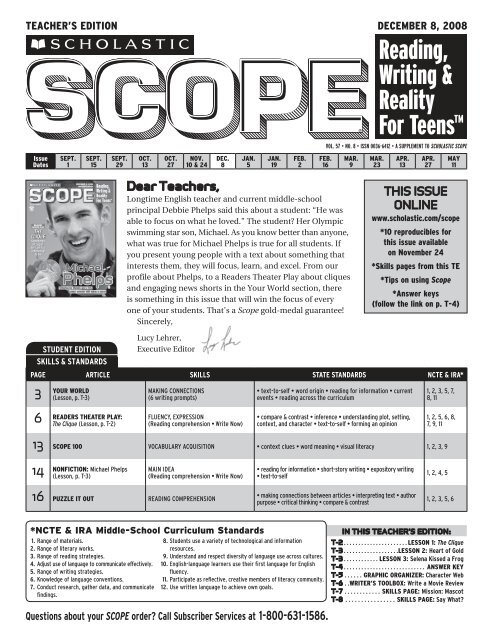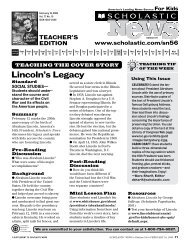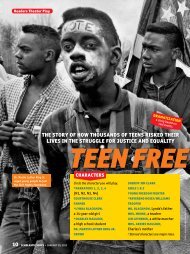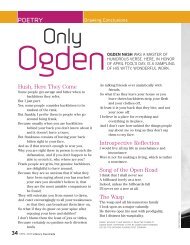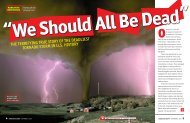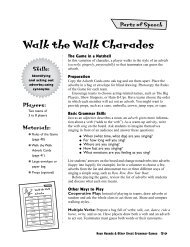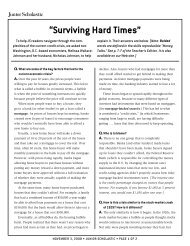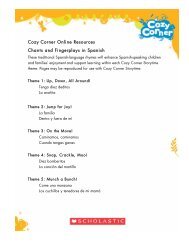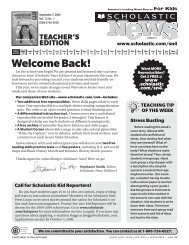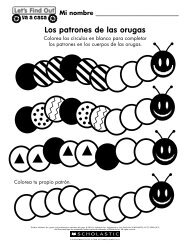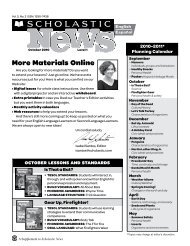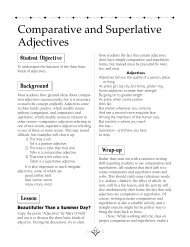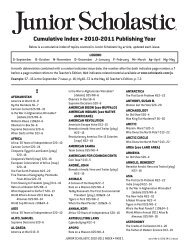1 - Scholastic
1 - Scholastic
1 - Scholastic
Create successful ePaper yourself
Turn your PDF publications into a flip-book with our unique Google optimized e-Paper software.
TEACHER’S EDITION December 8, 2008<br />
<br />
<br />
Vol. 57 • No. 8 • ISSN 0036-6412 • A supplement to <strong>Scholastic</strong> Scope<br />
Issue<br />
Dates<br />
SEPT.<br />
1<br />
SEPT.<br />
15<br />
sept.<br />
29<br />
OCT.<br />
13<br />
OCT.<br />
27<br />
NOV.<br />
10 & 24<br />
DEC.<br />
8<br />
JAN.<br />
5<br />
JAN.<br />
19<br />
FEB.<br />
2<br />
FEB.<br />
16<br />
MAR.<br />
9<br />
MAR.<br />
23<br />
APR.<br />
13<br />
APR.<br />
27<br />
MAY<br />
11<br />
Dear Teachers,<br />
Longtime English teacher and current middle-school<br />
principal Debbie Phelps said this about a student: “He was<br />
able to focus on what he loved.” The student? Her Olympic<br />
swimming star son, Michael. As you know better than anyone,<br />
what was true for Michael Phelps is true for all students. If<br />
you present young people with a text about something that<br />
interests them, they will focus, learn, and excel. From our<br />
profile about Phelps, to a Readers Theater Play about cliques<br />
and engaging news shorts in the Your World section, there<br />
is something in this issue that will win the focus of every<br />
one of your students. That’s a Scope gold-medal guarantee!<br />
Sincerely,<br />
THIS ISSUE<br />
ONLINE<br />
www.scholastic.com/scope<br />
*10 reproducibles for<br />
this issue available<br />
on November 24<br />
*Skills pages from this TE<br />
*Tips on using Scope<br />
*Answer keys<br />
(follow the link on p. T-4)<br />
STUDENT EDITION<br />
SKILLS & STANDARDS<br />
Lucy Lehrer,<br />
Executive Editor<br />
page article skills state standards NCTE & IRA*<br />
3<br />
your world<br />
(Lesson, p. T-3)<br />
MAKING CONNECTIONS<br />
(6 writing prompts)<br />
• text-to-self • word origin • reading for information • current<br />
events • reading across the curriculum<br />
1, 2, 3, 5, 7,<br />
8, 11<br />
6<br />
readers theater play:<br />
The Clique (Lesson, p. T-2)<br />
FLUENCY, EXPRESSION<br />
(Reading comprehension • Write Now)<br />
• compare & contrast • inference • understanding plot, setting,<br />
context, and character • text-to-self • forming an opinion<br />
1, 2, 5, 6, 8,<br />
7, 9, 11<br />
13 SCOPE 100 VOCABULARY ACQUISITION • context clues • word meaning • visual literacy 1, 2, 3, 9<br />
14<br />
NONFICTION: Michael Phelps<br />
(Lesson, p. T-3)<br />
MAIN IDEA<br />
(Reading comprehension • Write Now)<br />
• reading for information • short-story writing • expository writing<br />
• text-to-self<br />
1, 2, 4, 5<br />
16 PUZZLE IT OUT Reading comprehension<br />
• making connections between articles • interpreting text • author<br />
purpose • critical thinking • compare & contrast<br />
1, 2, 3, 5, 6<br />
*NCTE & IRA Middle-School Curriculum Standards<br />
1. Range of materials. 8. Students use a variety of technological and information<br />
2. Range of literary works. resources.<br />
3. Range of reading strategies. 9. Understand and respect diversity of language use across cultures.<br />
4. Adjust use of language to communicate effectively. 10. English-language learners use their first language for English<br />
5. Range of writing strategies. fluency.<br />
6. Knowledge of language conventions. 11. Participate as reflective, creative members of literacy community.<br />
7. Conduct research, gather data, and communicate 12. Use written language to achieve own goals.<br />
findings.<br />
Questions about your Scope order? Call Subscriber Services at 1-800-631-1586.<br />
in This TEACHER’S EDITION:<br />
T-2...................... LESSON 1: The Clique<br />
T-3................... LESSON 2: Heart of Gold<br />
T-3.............LESSON 3: Selena Kissed a Frog<br />
T-4............................. ANSWER KEY<br />
T-5.......GRAPHIC ORGANIZER: Character Web<br />
T-6.. WRITER’S TOOLBOX: Write a Movie Review<br />
T-7............. SKILLS PAGE: Mission: Mascot<br />
T-8 .................SKILLS PAGE: Say What?
Lesson<br />
1<br />
Readers Theater Play: The Clique p. 6<br />
Introduction & SUMMARY<br />
This issue’s play is based on the novel<br />
The Clique by Lisi Harrison and the<br />
new movie of the same name. It tells<br />
the story of the new girl in school,<br />
Claire Lyons, who must decide how<br />
far she’ll go to be accepted by the<br />
in-crowd.<br />
Objective<br />
To practice fluency and expression<br />
PRE-READING STRATEGies<br />
Before students read the play, lead<br />
a discussion about popularity. What<br />
does it mean to be popular? How far<br />
have students gone to impress potential<br />
friends? What motivates popular<br />
students to be “mean” to newcomers?<br />
Discussion<br />
1. Both Layne and Claire try to be<br />
friends with Massie, even though<br />
Massie is mean to them. How do<br />
Layne and Claire explain their own<br />
behavior? Would you be friends with<br />
Massie? Why or why not? (Claire says<br />
Massie and her friends are “special,”<br />
while Layne says they are only special<br />
because they believe they are. Answers<br />
will vary.)<br />
2. What would have happened if<br />
Massie jumped out of Chris’s birthday<br />
cake? What do you think of Claire’s<br />
decision to rescue Massie? What would<br />
you have done? (She would have been<br />
humiliated because Chris already had<br />
a girlfriend. Answers will vary.)<br />
3. Return to the last discussion question<br />
in the Pre-Reading Strategy. After<br />
reading the play, has your answer to<br />
this question changed? What does<br />
Massie imply when she tries to explain<br />
her behavior to Claire? (Massie was<br />
mean to Claire because Massie felt<br />
threatened. Answers will vary.)<br />
ExtensionS<br />
Writing Prompt: Friendship<br />
Write a short essay that answers the<br />
following questions: What does friendship<br />
mean to Massie Block? What does<br />
friendship mean to Claire Lyons? What<br />
does friendship mean to you? Use<br />
examples to support your answers.<br />
Writing Prompt: Wrapping<br />
Ask students to consider the following<br />
quotation:<br />
“If most of us are ashamed of shabby clothes<br />
and shoddy furniture, let us be more ashamed<br />
of shabby ideas and shoddy philosophies. It<br />
would be a sad situation if the wrapper were<br />
better than the meat wrapped inside it.”<br />
—Albert Einstein<br />
As a class, discuss the meaning of this<br />
quotation. Then have students write<br />
an essay applying it to the play.<br />
Understanding Sarcasm<br />
Sarcasm is a form of verbal irony that<br />
tends to be mocking. Divide students<br />
into groups, and have them identify<br />
sarcastic dialogue. Answers may<br />
include:<br />
•“Are the tigers and bears coming<br />
too?” (Massie, Scene 1)<br />
•“I don’t eat feet.” (Massie, Scene 4)<br />
•“I know one local charity who could<br />
use a donation.” (Massie, Scene 5)<br />
•“Congrats, you got your wish.”<br />
(Alicia, Scene 5)<br />
•“Sorry, I don’t speak loser.” (Massie,<br />
Scene 8)<br />
teacher’s Corner<br />
RESOURCES<br />
n Lesson Plans<br />
•“Language Development: Yours<br />
and Humankind’s” by Renea<br />
Shuey. Students brainstorm the<br />
evolution of communication, with<br />
an animated activity. They also<br />
create a timeline to illustrate their<br />
own communication evolution.<br />
www2.scholastic.com/browse<br />
/lessonplan.jsp?id=444<br />
•“Create Your Own Coded <br />
Language” by Renea Shuey. Use<br />
the iChat dialogue in the play as a<br />
jumping off point for this lesson, in<br />
which students discover cryptology<br />
used in their everyday lives.<br />
They will create their own secret<br />
writing or coded messages, and<br />
develop a dictionary of eponyms.<br />
www2.scholastic.com/browse<br />
/lessonplan.jsp?id=446<br />
n Web Sites<br />
•Official site of the book: <br />
www.jointheclique.com<br />
•Official site of the film: <br />
www.thecliquemovie.com<br />
n Scope online reproducibles<br />
•Understanding tone<br />
•Main idea<br />
www.scholastic.com/scope<br />
Morning Pages<br />
Freewriting can help students get comfortable expressing themselves<br />
with words, without having to worry about earning a grade. For 5 to<br />
10 minutes every day, have students write in a stream-of-consciousness<br />
format about anything they want.<br />
If they need help getting started, they may reflect on the weather, a<br />
movie, a song, a piece of clothing, a color, their rooms, etc. Here are<br />
some other prompts to inspire creative writing:<br />
• What is the last emotion you felt and why?<br />
• Describe the view from a window in your home.<br />
• What is the coolest hairstyle you ever saw?<br />
• Explain the last thing you thought about before falling asleep<br />
last night.<br />
T-2 <strong>Scholastic</strong> sCOPE TEACHER’S EDITION • December 8, 2008
Lesson<br />
2<br />
Introduction & SUMMARY<br />
Students will read about Olympic swim<br />
champ Michael Phelps—from how<br />
he dealt with AD/HD to his winning<br />
eight gold medals at the Olympics and<br />
starting a charity for kids.<br />
Objective<br />
To identify main idea<br />
PRE-READING STRATEGY<br />
Lead a short discussion to remind the<br />
class about the Summer Olympics. Did<br />
students watch the Olympics? What<br />
was their favorite part? Ask students<br />
what they know about Michael Phelps.<br />
Do they know why he’s famous?<br />
Discussion<br />
1. What obstacles did Phelps face as a<br />
kid? Have you ever dealt with problems<br />
like that? How did you cope? (He was<br />
bullied, and he had AD/HD. Answers<br />
will vary.)<br />
Nonfiction: Heart of Gold p. 14<br />
2. Phelps says being bullied made him<br />
stronger. Why do you think that is?<br />
How do you handle obstacles? (Answers<br />
will vary.)<br />
Extension<br />
Writing Prompt: Big Wins<br />
Give the class the following prompt:<br />
Imagine that you won $1 million, like<br />
Michael Phelps did. Write a one-page<br />
essay explaining in detail how you<br />
would use your winnings. Would you<br />
spend? Save? Start a charity?<br />
Writing Prompt: Bullies<br />
Give the class the following prompt:<br />
How do you think the kids who once<br />
bullied Michael Phelps feel today,<br />
now that Phelps is a world-famous,<br />
record-setting athlete? Write a short<br />
fictional story about a bully, in which<br />
the victim overcomes the situation by<br />
becoming strong and successful like<br />
Phelps did.<br />
RESOURCES<br />
n Web Site<br />
• Michael Phelps’s site includes <br />
bio, trivia, videos, and more: <br />
www.swimroom.com/phelps<br />
n Lesson Plans<br />
• ”Tell Us a Tale: Teaching Students<br />
to Be Storytellers.” Students take<br />
an existing story and learn how to<br />
make it their own. <br />
www2.scholastic.com /browse<br />
/article.jsp?id=4558<br />
• “Strategies for Active Reading” by<br />
Rita McLary. Strengthens <br />
students’ independent reading<br />
habits and offers tips on how to<br />
retain reading material. <br />
www2.scholastic.com/browse<br />
/article.jsp?id=2947<br />
n Scope online reproducibles<br />
• Reading-comprehension quiz<br />
• Interpreting charts<br />
www.scholastic.com/scope<br />
Lesson<br />
3<br />
Introduction<br />
Students will read a short news item<br />
about teen star Selena Gomez and her<br />
work to save endangered amphibians.<br />
Objective<br />
To read for information<br />
PRE-READING STRATEGY<br />
Ask the class what they know about<br />
Public Service Announcements (PSAs).<br />
Explain that PSAs are similar to<br />
advertisements, but instead of enticing<br />
people to buy a product, PSAs raise<br />
public awareness about an issue. Can<br />
students think of any PSAs? (Example:<br />
Michael J. Fox as a spokeperson for<br />
Parkinson’s Disease.) Tell the class they<br />
are going to read about Selena Gomez<br />
and her PSA to save amphibians.<br />
Your World: Selena Kissed a Frog p. 4<br />
Discussion<br />
PSAs often use celebrities like Selena<br />
Gomez to be spokespeople. Why do<br />
you think that is? Does it work? (Using<br />
a celebrity helps attract attention to a<br />
cause. Answers will vary.)<br />
Extension<br />
Research: Frog Facts<br />
Selena says, “What happens to frogs<br />
today can affect people in the future.”<br />
Teach students how to put what they<br />
hear in the media to the test. Divide<br />
the class into small groups to research<br />
how frogs affect people (why they are<br />
important), and if/why they are in<br />
global danger. The resources at right<br />
can be used to guide their research.<br />
Have each group present its findings<br />
to the class.<br />
RESOURCES<br />
n Books<br />
• Amphibian Declines by Michael<br />
Lannoo (University of California<br />
Press, 2005)<br />
• Frog Rescue: Changing the Future<br />
for Endangered Wildlife by Garry<br />
Hamilton (Firefly Books, 2004)<br />
n Web Sites<br />
• Association of Zoos & Aquariums:<br />
www.aza.org<br />
• Conservation International: <br />
http://web.conservation.org/xp<br />
/amphibians/index2.xml<br />
• Selena’s PSA official site: <br />
www.yearofthefrog.org<br />
• U.S. Fish & Wildlife Service page for<br />
students: www.fws.gov/educators<br />
/students.html<br />
EDITORIAL: Executive Editor: Lucy Lehrer • Associate Editor: Kristin Lewis • Senior Associate Online Editor: Zach Jones • Executive Editor, Media: Marie Morreale • ART: Design Director: Felix Batcup • Photo Editor: Lois Safrani • PRODUCTION:<br />
Production Editor: William McDonald • Copy Chief: Renee Glaser • Copy Editor: Veronica Majerol • Digital Imager: Marc Stern • MAGAZINE GROUP: President, <strong>Scholastic</strong> Classroom & Library Group: Greg Worrell • VP, Editor in Chief: Rebecca Bondor<br />
• Creative Director: Judith Christ-Lafond • Executive Production Director: Barbara Schwartz • Executive Editorial Director, Copy Desk: Craig Moskowitz • Publishing System Director: David Hendrickson • Executive Director of Photography: Steven<br />
Diamond • Senior Administrative Coordinator: Mirtha Williams • Library Manager: Kerry Prendergast • Reference Librarian: Karen Van Rossem • CIRCULATION & MARKETING: VP, Marketing: Jocelyn Forman • Marketing Manager: Leslie Tevlin • Business<br />
Manager: Karen Lo • Manufacturing & Distribution: Director: Mimi Esguerra • Manufacturing Coordinator: Georgiana Deen • CORPORATE: President, Chief Exec. Officer, and Chairman of the Board of <strong>Scholastic</strong> Inc.: Richard Robinson<br />
December 8, 2008 • scholastic SCOPE TEACHER’S EDITION t-3
<strong>Scholastic</strong> scope Skills<br />
REUSABLE<br />
Graphic Organizer<br />
Name: ____________________________________ Class: ___________________ Date: _____________<br />
Character Web<br />
Directions: It’s easier to understand a story if you “know” the characters. Use this graphic organizer<br />
to analyze a character from The Clique, or from any other work you’ve read. Begin by putting the character name<br />
in the box at the center of the page.<br />
What do OTHERS SAY about<br />
this character?<br />
What does this character SAY?<br />
Choose a line from<br />
the text that reveals something<br />
about the character.<br />
Character Name<br />
What does this character DO?<br />
List specific actions and choices.<br />
Available<br />
as a PDF at<br />
scholastic.com<br />
/scope<br />
How does this character LOOK?<br />
List examples of descriptive<br />
details.<br />
Make inferences about this character. Would he or she be a good friend? Is the character well-liked? Would the plot<br />
change without this character? In what ways?<br />
_______________________________________________________________________________________________________________<br />
_______________________________________________________________________________________________________________<br />
_______________________________________________________________________________________________________________<br />
_______________________________________________________________________________________________________________<br />
_______________________________________________________________________________________________________________<br />
_______________________________________________________________________________________________________________<br />
December 8, 2008 • scholastic SCOPE TEACHER’S EDITION t-5<br />
Uses: Copy machine, opaque projector, or transparency master for overhead projector. <strong>Scholastic</strong> Inc. grants subscribers of <strong>Scholastic</strong> Scope permission to reproduce this page for use in their classrooms. Copyright © 2008 by <strong>Scholastic</strong> Inc. All rights reserved.
Writer’s toolbox<br />
REUSABLE<br />
Skill: Writing Reviews<br />
Name: ___________________________________ Class: ___________________ Date: _____________<br />
Write a Movie Review<br />
Directions: Did you see an awesome film recently? Tell us all about it! Use this guide to organize your ideas.<br />
Then write your review on another piece of paper. Send it to Scope, 557 Broadway, New York, NY 10012, for a chance<br />
to have it published.<br />
Organize Your Thoughts<br />
<br />
Select a film to review, and then answer the following questions to help you decide what to write.<br />
t-6 <strong>Scholastic</strong> sCOPE TEACHER’S EDITION • December 8, 2008<br />
Available<br />
as a PDF at<br />
scholastic.com<br />
/scope!<br />
1. What is the movie title, and who is the director?_ ____________________________________________<br />
________________________________________________________________________________________<br />
2. What is the genre (drama, romance, comedy, fantasy, action-adventure, etc.)?_ _________________<br />
3. Which scene did you like best and why? ____________________________________________________<br />
________________________________________________________________________________________<br />
________________________________________________________________________________________<br />
4. Describe the main characters: ____________________________________________________________<br />
________________________________________________________________________________________<br />
________________________________________________________________________________________<br />
5. Describe how the actors portrayed these characters: _________________________________________<br />
________________________________________________________________________________________<br />
________________________________________________________________________________________<br />
6. What is a major theme of the movie? _______________________________________________________<br />
________________________________________________________________________________________<br />
7. What kind of person might enjoy this movie? (Example: If you liked The Clique, then you will love<br />
Mean Girls.) _ ___________________________________________________________________________<br />
________________________________________________________________________________________<br />
8. How does it compare with other films in the same genre?_______________________________________<br />
________________________________________________________________________________________<br />
________________________________________________________________________________________<br />
9. What is your overall impression of the movie? ______________________________________________<br />
________________________________________________________________________________________<br />
________________________________________________________________________________________<br />
Uses: Copy machine, opaque projector, or transparency master for overhead projector. <strong>Scholastic</strong> Inc. grants subscribers of <strong>Scholastic</strong> Scope permission to reproduce this page for use in their classrooms. Copyright © 2008 by <strong>Scholastic</strong> Inc. All rights reserved.
<strong>Scholastic</strong> scope Skills<br />
REUSABLE<br />
Skill: Interpreting Charts<br />
Name: ___________________________________ Class: ___________________ Date: _____________<br />
Mission: Mascot<br />
Directions: Washington High School wants to choose a new mascot. Read the following chart about<br />
the votes from various clubs and teams. Then answer the questions below. If you can’t find the answer<br />
on the chart, write “not enough information.”<br />
MASCOT<br />
TOTAL<br />
VOTES<br />
Football<br />
Team<br />
Chess<br />
Club<br />
1. What is Washington High School’s new mascot?<br />
Available<br />
as a PDF at<br />
scholastic.com<br />
/scope<br />
_________________________________________________________________________________________<br />
2. Which club or team cast the highest number of votes?<br />
_________________________________________________________________________________________<br />
3. What was the second-most-popular choice for the Drama Club?<br />
_________________________________________________________________________________________<br />
4. Which club or team wanted to be the Bears?<br />
_________________________________________________________________________________________<br />
5. Which was the least popular mascot among Chess Club voters?<br />
_________________________________________________________________________________________<br />
6. What was the least popular mascot among Science Club voters?<br />
_________________________________________________________________________________________<br />
7. Why did Washington High School want a new mascot?<br />
Science<br />
Club<br />
Drama<br />
Club<br />
_________________________________________________________________________________________<br />
8. How many votes in favor of being the Tigers were not cast by the football team?<br />
Band Club<br />
TIGERS 60 30 10 10 5 5<br />
KNIGHTS 65 15 35 5 5 5<br />
STARS 50 3 7 10 25 5<br />
BEARS 35 0 1 30 2 3<br />
SNAKES 75 2 3 0 10 60<br />
_________________________________________________________________________________________<br />
December 8, 2008 • scholastic SCOPE TEACHER’S EDITION t-7<br />
Uses: Copy machine, opaque projector, or transparency master for overhead projector. <strong>Scholastic</strong> Inc. grants subscribers of <strong>Scholastic</strong> Scope permission to reproduce this page for use in their classrooms. Copyright © 2008 by <strong>Scholastic</strong> Inc. All rights reserved.
SCOPE SKILLS<br />
REUSABLE<br />
Skill: Context Clues<br />
Name: ____________________________________ Class: ___________________ Date: _____________<br />
Say What?<br />
Have you ever come across a word you didn’t know? You don’t always have to reach for the dictionary.<br />
First, try using context clues:<br />
• Use other words in the sentence to figure out the meaning of the word you don’t know.<br />
• See if you can determine the part of speech. Knowing the word is a verb as opposed to a noun<br />
will help you find its meaning.<br />
Directions: Read the following sentences. Use context clues to find the meaning of the words in bold.<br />
(We picked really hard words on purpose!) Circle the definition you think best fits the word.<br />
1. As Jason walked through the doorway for the holiday dinner, his Auntie Mildred couldn’t help but hug<br />
and osculate him on the cheek.<br />
a. slap b. kiss c. facepaint<br />
2. Jason didn’t eat all day in order to save room for the feast. As a result, he was making loud borborygmi.<br />
a. stomach rumblings b. declarations of love c. bad jokes<br />
3. Cousin Billy has a bit of lachanophobia, so the sight of the broccoli and carrots next to the turkey<br />
made him nervous.<br />
a. fear of vegetables b. a pilot of planes<br />
c. someone who wishes for world peace<br />
4. Jason got stuck sitting next to his Uncle Joe, who had a bad case of logorrhea. Jason could hardly<br />
get a word in as Uncle Joe told the same football stories Jason had heard a million times.<br />
a. bad breath b. a rash associated with sports c. talking too much<br />
5. Something hilarious must have happened at the little kids’ table, because they suddenly started<br />
to cachinnate.<br />
a. laugh loudly b. sneeze c. discuss politics<br />
6. After eating seconds and thirds, the whole family was pretty crapulous.<br />
a. silly and giddy b. tired and lazy c. stuffed from overeating<br />
7. Grandpa pandiculated on the couch. He was taking up the entire couch and snoring loudly as he slept.<br />
a. curled up b. perched c. spread out, stretched<br />
8. In the kitchen, cousin Julie was needlessly arguing with Auntie Mildred about pumpkin pie versus<br />
apple pie. Cousin Julie can be such a pettifogger.<br />
a. a lover of desserts b. someone who argues about trivial matters<br />
c. an excellent cook<br />
t-8 <strong>Scholastic</strong> sCOPE TEACHER’S EDITION • DECEMBER 8, 2008<br />
Available<br />
as a PDF at<br />
scholastic.com<br />
/scope<br />
Uses: Copy machine, opaque projector, or transparency master for overhead projector. <strong>Scholastic</strong> Inc. grants subscribers of <strong>Scholastic</strong> Scope permission to reproduce this page for use in their classrooms. Copyright © 2008 by <strong>Scholastic</strong> Inc. All rights reserved.


